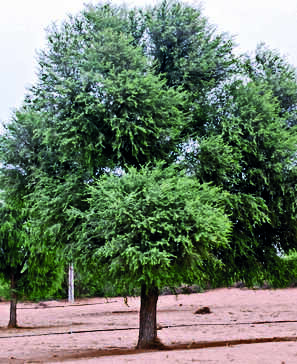Rajasthan
Sangri Fruits In Peril As Khejri Trees Fall Prey To Pests & Moisture | Jaipur News
Jaisalmer: Sangri fruit, a specialty of desert areas, is in mortal danger. The Khejri tree on which it grows has become prone to infestation by pests in recent years, and this year the situation is so bad that Sangri production is down by 50%, while the market prices have risen manifold.
Sangri fruit that sold for about Rs 800 per kg is now selling for Rs 3,000 per kg, traders say. In the past 4-5 years, due to factors like climate change, reckless pruning, irrigation by tubewells, use of pesticides, etc, Khejri trees have started drying up and production of Sangri has fallen.
Environmentalist Sumer Singh Sawta said that when Khejri trees are infested by insects, they dry up and stop producing fruit. This year, he said, the infestation spread tremendously, so much so that only 5 to 10 percent of the Khejri trees produced Sangri.
Sawta said the biggest reason for Khejri trees getting infected is “moisture”, which makes it easier for pests to breed.
Director of the Arid Forest Research Institute in Jodhpur, M R Baloch, agreed with Sawta and confirmed that every year about 10% of Khejri trees in Rajasthan were drying up due to infestation by pests.
Baloch said moisture allows pests and fungus to grow in the soil and infect the tree. Instead of Sangri fruit, tumour-like outgrowth happens in tree branches. The larvae of the pests stay and grow in the small holes in these “tumours”. Baloch said farmers prune the branches even though respiration happens through leaves. Due to absence of leaves, the treesgrow weak, vulnerable to pests.
Sangri fruit that sold for about Rs 800 per kg is now selling for Rs 3,000 per kg, traders say. In the past 4-5 years, due to factors like climate change, reckless pruning, irrigation by tubewells, use of pesticides, etc, Khejri trees have started drying up and production of Sangri has fallen.
Environmentalist Sumer Singh Sawta said that when Khejri trees are infested by insects, they dry up and stop producing fruit. This year, he said, the infestation spread tremendously, so much so that only 5 to 10 percent of the Khejri trees produced Sangri.
Sawta said the biggest reason for Khejri trees getting infected is “moisture”, which makes it easier for pests to breed.
Director of the Arid Forest Research Institute in Jodhpur, M R Baloch, agreed with Sawta and confirmed that every year about 10% of Khejri trees in Rajasthan were drying up due to infestation by pests.
Baloch said moisture allows pests and fungus to grow in the soil and infect the tree. Instead of Sangri fruit, tumour-like outgrowth happens in tree branches. The larvae of the pests stay and grow in the small holes in these “tumours”. Baloch said farmers prune the branches even though respiration happens through leaves. Due to absence of leaves, the treesgrow weak, vulnerable to pests.





